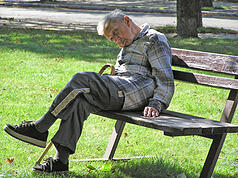Obesity is a major public health concern. We often hear how the risk for diseases including diabetes and heart disease increase with obesity. But what causes the risk of obesity to increase and which of these risk factors are modifiable? There’s nothing you can do about genetics but what we certainly can change are our habits. We can be physically active, pay better attention to what we eat, and reduce portion sizes to name a few. But what else can we do?
 A link with sleep? That is precisely what researchers have been trying to figure out by looking at the growing body of evidence suggesting a link between sleep quality and duration and body weight. The National Sleep Foundation identifies that most adults need 7-9 hours of sleep every night and that number goes up for teens, children, and infants.
A link with sleep? That is precisely what researchers have been trying to figure out by looking at the growing body of evidence suggesting a link between sleep quality and duration and body weight. The National Sleep Foundation identifies that most adults need 7-9 hours of sleep every night and that number goes up for teens, children, and infants.
Sleep benefits. It’s probably easy to notice that when we wake up in the morning after a good night’s rest, we feel alert, rejuvenated, and bright eyed. We look better, feel better and our mood improves. This is because during the sleeping phase, our body goes through different stages of sleep that are essential for muscle repair, memory consolidation, and for the regulation of certain appetite and growth hormones. In the third and fourth stages of sleep (your deepest most restorative sleep), blood pressure drops, muscles relax allowing blood to flow for tissue growth and repair, and then hormones are released.
Hormone release is important. Some research suggests that hormones may play a major role in the correlation between increased body weight and reduced sleep duration. When your sleep pattern is disrupted, the release of certain hormones is also disrupted. Normally when you sleep, leptin reaches its peak levels. This hormone decreases appetite, increases metabolism, and promotes fat to be burned for energy. Ghrelin, on the other hand, is a hormone which tells your body it needs more energy so it causes a sensation of hunger to increase appetite. Without enough sleep, hormone levels shift and the ratio of leptin to ghrelin decreases. Growth hormone, which is important for maintaining fat metabolism, also decreases with a lack of sleep. So with decreased fat utilization, metabolism, and increased hunger it is easy to see why so many studies are showing a large increase in calorie consumption and weight gain in the sleep deprived.
Elevated risk for diabetes. Not only does the lack of sleep cause increases in caloric intake and weight gain, but also an increased risk for diabetes. When someone is sleep deprived the release of certain hormones that affect glucose metabolism is altered resulting in reduced glucose tolerance. Studies also show that beta cell function (the cells that produce insulin) can be decreased up to 50% during sleep deprivation.
 So what can you do? Increase your sleep by improving your night time routine and improving your bedroom environment! The National Sleep Foundation recommends that you get rid of all noise disturbances, keep room temperature between 54 and 75 degrees Fahrenheit, ensure all lights are turned off including the glow of a cell phone, computer, or TV, and get a roomy comfortable bed. It is also suggested to avoid alcohol, caffeine, nicotine, exercise within three hours of bedtime (working out in the day is related to improved sleep while night sessions delay the release of melatonin), and large meals which cause indigestion.
So what can you do? Increase your sleep by improving your night time routine and improving your bedroom environment! The National Sleep Foundation recommends that you get rid of all noise disturbances, keep room temperature between 54 and 75 degrees Fahrenheit, ensure all lights are turned off including the glow of a cell phone, computer, or TV, and get a roomy comfortable bed. It is also suggested to avoid alcohol, caffeine, nicotine, exercise within three hours of bedtime (working out in the day is related to improved sleep while night sessions delay the release of melatonin), and large meals which cause indigestion.
What is your key to getting a good night’s rest?
References:
Hasler G, Buysse DJ, Klaghofer R, Gamma A, Ajdacic V, Eich D, Rossler W, Angst J. The association between short sleep duration and obesity in young adults: a 13 year prospective study. Sleep. 2004. 27 (4): 661-666.
How Sleep Works. National Sleep Foundation website. http://www.sleepfoundation.org/article/how-sleep-works/the-sleep-environment Accessed 08/2012.
Kondracki N. The Link between Sleep and Weight Gain. Today’s Dietitian. 2012; 14 (6):48-54.
Lyytikainen P, Rahkonen O, Lahelma E, Lallukka T. Association of sleep duration with weight and weight gain: a prospective follow up study. J. Sleep Res. 2011. 20: 298-302.
Singh M, Drake CL, Roehrs T, Hudgel DW, Roth T. The assocaiton between obesity and short sleep duration: a population based study. J Clin Sleep Med. 2005 1(4): 357-363
The Sleep Environment. National Sleep Foundation website. http://www.sleepfoundation.org/article/how-sleep-works/the-sleep-environment. Accessed 08/2012.
Watson N, Buchwald D, Vitiello M, Noonan C, Goldberg J. A Twin Study of Sleep Duration and Body Mass Index. J Clin Sleep Med. 2010; 6 (1): 11-17.
What Happens When You Sleep. National Sleep Foundation website. http://www.sleepfoundation.org/article/how-sleep-works/the-sleep-environment Accessed 08/2012.




